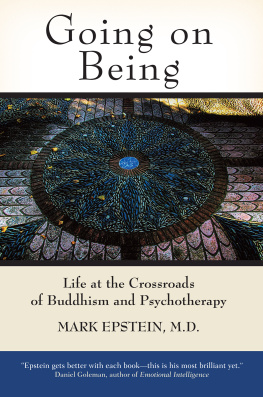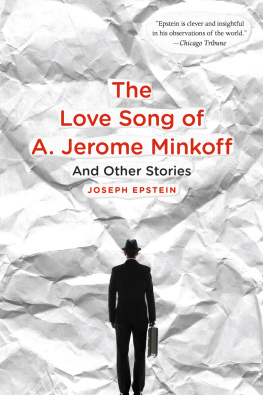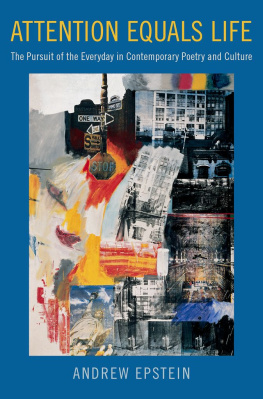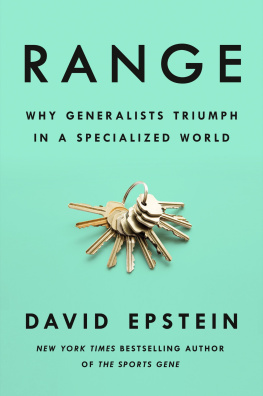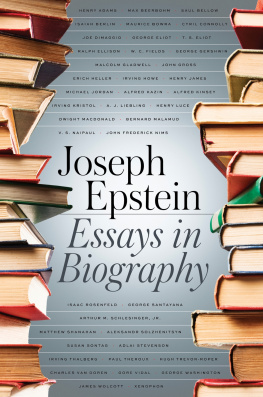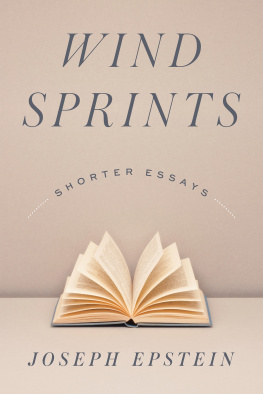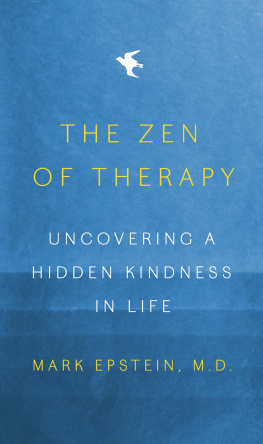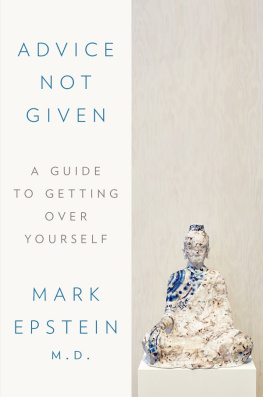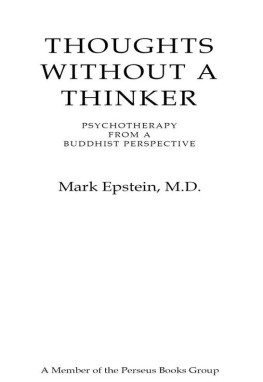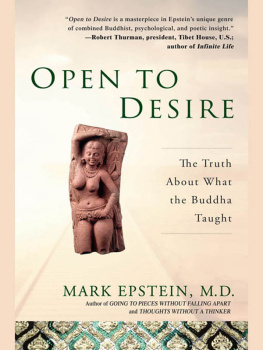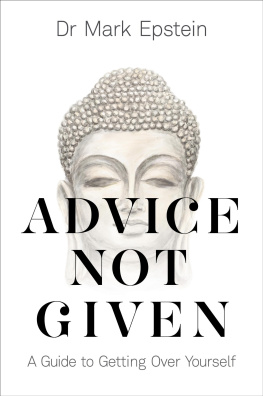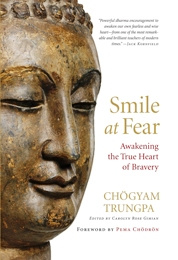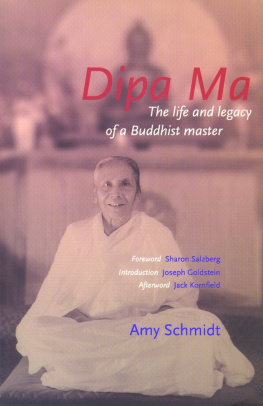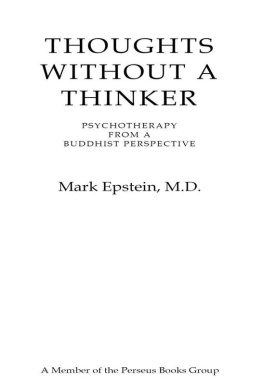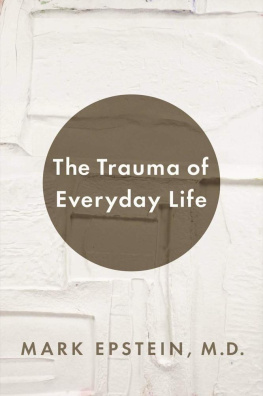PRAISE FOR GOING ON BEING
Mark Epstein gets better and better with each book; Going on Being is his most brilliant yet. He weaves a mindful cartography of the human heart, tying together insights from Buddhism and psychoanalytic thought into an elegant, captivating tapestry. Epstein shares the spiritual and emotional insights garnered from his own life journey in a fascinating account of what it can mean to us all to go on being.
Daniel Goleman, author of Emotional Intelligence
Every element of Mark Epsteins brilliant and beautiful new book is on the highest levelthe spiritual insights, the psychotherapeutic perspective, and his own very human story of wanting to bring greater awareness and love into his life. Going on Being opens a door on what it means to understand ourselves, to grow and change.
Sharon Salzberg, author of Lovingkindness and A Heart as Wide as the World
Mark Epsteins Going on Being joins the heart of psychotherapy with the heart of Buddhism. It takes us to freeing places, uplifts our lives. Honest, personal, searchingit affirms the goodness of our existence and encourages an openness that keeps us fresh.
Michael Eigen, author of The Psychoanalytic Mystic
A calm comes over me when I read Mark Epsteins work. His integration of Buddhist wisdom and meditative practice with the concerns and struggles of contemporary Western life reflects a seemingly impossible combination of rich, intricate texture with simplicity and vividness. Going on Being extends Epsteins vision and provides a personal memoir of his introduction to Buddhist thought in the context of transformative relationships with some remarkable men. There is a freshness and relevance to Epsteins vision that makes this book a treasure and an important opportunity for anyone who takes their existence seriously (but not too seriously).
Stephen A. Mitchell, founding editor of Psychoanalytic Dialogues: A Journal of Relational Perspectives
Through a graceful and generous recounting of his own quest for healing, Mark Epstein brings together certain core insights of Buddhism and psychotherapy in a way that is newly illuminating. The result is what Buddhists call a field of benefaction. I felt happy reading this book. It will gonext to his two previous offeringsamong the handful of books that I keep near me for those times, in the middle of the night, when I reach for true solace.
Noelle Oxenhandler, author of The Eros of Parenthood
Wisdom Publications
199 Elm Street
Somerville MA 02144 USA
www.wisdompubs.org
2001, 2008 Mark Epstein, M.D.
All rights reserved.
No part of this book may be reproduced in any form or by any means, electronic or mechanical, including photography, recording, or by any information storage and retrieval system or technologies now known or later developed, without permission in writing from the publisher.
Library of Congress Cataloging-in-Publication Data
Epstein, Mark, 1953
Going on being : life at the crossroads of Buddhism and therapy / Mark Epstein.
p. cm.
Previously published: New York : Broadway Books, c2001.
Includes bibliographical references and index.
ISBN 0-86171-569-1 (pbk. : alk. paper)
1. BuddhismPsychology. 2. PsychotherapyReligious aspectsBuddhism. 3. Awareness. 4. Spiritual lifePsychology. 5. Epstein, Mark, 1953- I. Title.
BQ4570.P76E664 2009
294.342dc22
2008041530
Mind from The Dhammapada . Copyright, P. Lal, Writers Workshop, 162/92 Lake Gardens, Calcutta 700045 India.
ISBN 978-0-86171-569-5
eBook ISBN 978-0-861710-959-4
Cover design by Pema Studios. Interior design by Dede Cummings. Set in Weiss 11/15. Cover image Vitalijus Majauskis.
FOR ARLENE
The alternative to being is reacting, and reacting interrupts being and annihilates.
D.W. Winnicott
CONTENTS
Acknowledgments
INTRODUCTION
T here is an obscure story about one of Freuds personal conversations that puts an interesting twist on the state of psychology in the West. The discussion was with Ludwig Binswanger, a Swiss psychiatrist and the founder of the existential movement in psychoanalysis. Binswanger felt that there was something missing in Freuds approach to therapytoo many patients simply did not get better. He raised the problem of the paralysis of analysis with Freud.
Might there not be a deficiency of spirit, asked Binswanger delicately, such that certain people were unable to raise themselves to a level of spiritual communication with their analysts? Could this lack of spiritual communication be the thing that stopped people from healing? To Binswangers surprise, the old man readily acknowledged his point. Yes, he said, spirit is everything.
Binswanger thought that Freud must have misunderstood his use of the word spirit, perhaps thinking he meant something on the order of intelligence. But Freud continued on.
Mankind has always known that it possesses spirit, Freud said. I had to show that there are also instincts.
When Freud sought to make room for instincts against the background of spirit, he did not anticipate a time when we would forget about spirit altogether. He could not foresee an era when instincts would reign supreme. By the time I was growing up in twentieth-century America, however, spirit already seemed out of reach. Freuds psychology was the accepted language of the mind, challenged only by B. F. Skinners behaviorism. Those of us who sensed a deficiency of spirit were aware only of a feeling of absence, a yearning for something intangible, a sense of emptiness that could not be explained. We did not have words or concepts for what we were missing. Even today, one of the most common questions that I am asked is the meaning of the word spiritual . Many people have lost touch with it altogether.
Anything that takes us beyond the personality, I usually reply. The most important gift that my encounters with Buddhism have given me is access to this spirit that Freud seemed to have taken for granted. Its recovery was of crucial importance to me.
Freud was wrong on one particular point in his conversation with Binswanger: Mankind does not always know that it has spiritsometimes we forget.
HOW PEOPLE CHANGE
Examples of this forgetting abound, even among those searching for a spiritual life. The split between instincts and spirit comes up in my practice all of the time. A woman named Sally, for instance, called not so long ago seeking advice from me. I had seen her for a single session in consultation months before, and we had talked about a variety of therapeutic and spiritual issues. She was suspicious of the role of psychiatric medications in todays culture. It seemed like some kind of brave new world to have mood-altering drugs so readily available. But Sally wondered if there might not be a medicine that could help her. She had been plagued with chronic feelings of anxiety and depression for much of her adult life, and despite a healthy investment in psychotherapy she still felt that there was something the matter with her.
Sally had been taking a small dose of an antidepressant for several weeks, ten milligrams of Prozac, and she was finding that she felt calmer, less irritable, and, dare she say, happier. She was planning on going to a two-week meditation retreat later that month and was wondering whether to stay on her medicine while she was there. Something about taking it while on retreat made her uncomfortable, and that was the reason for her call. Perhaps I should go more deeply into my problems while Im away, Sally questioned. She worried that the antidepressant would impede that process by making her problems less accessible to her. What did I think?
Next page
